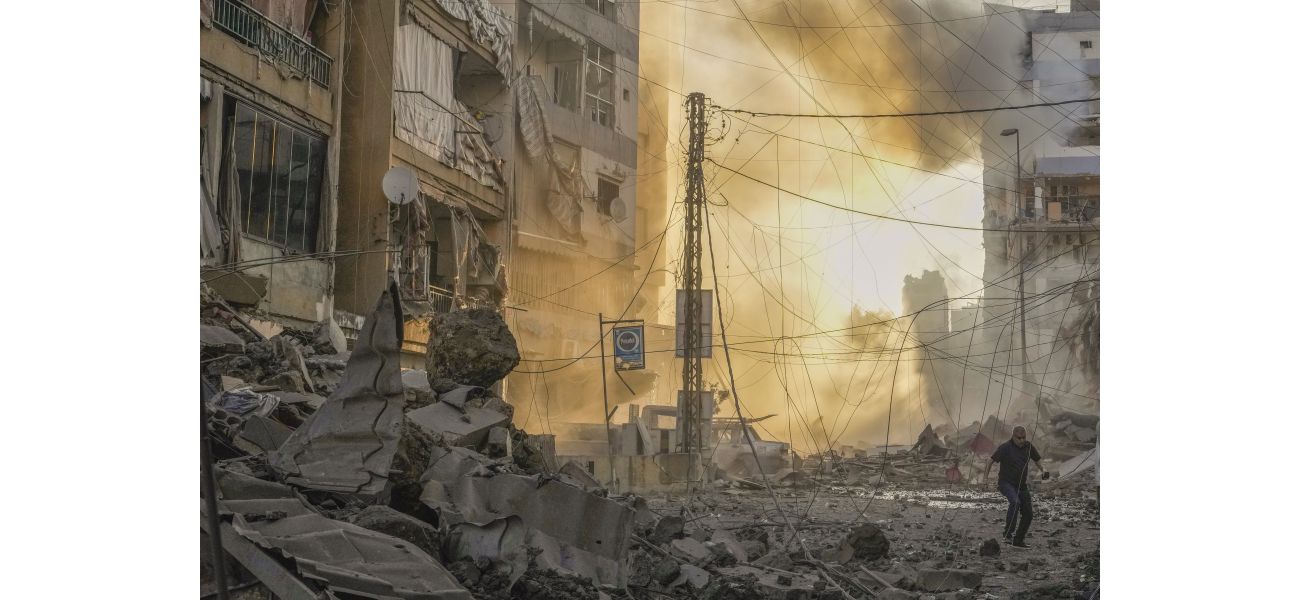Israel's air attacks on Beirut disrupt travel into Syria via a vital crossing.
Israel launched big air attacks, hitting Beirut suburbs and blocking the main border crossing between Lebanon and Syria, preventing many from escaping the bombing.
October 4th 2024.

In the midst of ongoing conflict, Israel carried out a series of airstrikes overnight, targeting suburbs of the Lebanese capital, Beirut. The strikes caused massive explosions and sent plumes of smoke and flames into the night sky, shaking buildings kilometers away. The Israeli military did not provide information on the intended target or any potential casualties, but Lebanon's state-run National News Agency reported at least 10 consecutive airstrikes in the area.
Meanwhile, Hezbollah, a militant group in Lebanon, launched around 100 rockets into Israel on Friday. This comes as fighting between Israel and Hezbollah continues. The Israeli military also confirmed that a strike in Beirut the day before killed a key member of Hezbollah, Mohammed Rashid Skafi, who was responsible for the group's communications division. According to the military, Skafi was closely affiliated with high-ranking Hezbollah officials and had been in charge of their communications since 2000.
Thursday's strike near the Lebanon-Syria border resulted in the closure of a busy border crossing, known as Masnaa. Israel stated that the crossing was being used by Hezbollah to transport military equipment from Iran and other proxies into Lebanon. The Israeli fighter jets targeted a tunnel used for smuggling weapons, as Hezbollah is believed to receive much of its weaponry from Iran through Syria. Hezbollah has a presence on both sides of the border and has been fighting alongside Syrian President Bashar Assad's forces.
Footage from the Associated Press showed the aftermath of the strike, with two large craters on either side of the road. This led to the closure of the road and caused people to cross the border on foot, carrying their belongings with them. Over the past two weeks, tens of thousands of people have fled from Lebanon to Syria to escape the war.
Amidst these events, Iran's Foreign Minister Abbas Araghchi arrived in Beirut for meetings with Lebanese officials. He warned that if Israel were to attack Iran, they would retaliate strongly. Araghchi's visit came just days after Iran launched over 180 missiles into Israel, escalating tensions in the region. Iran is a major supporter of Hezbollah and has provided them with weapons and funding over the years.
In Tehran, Iran's Supreme Leader Ayatollah Ali Khamenei led Friday prayers and praised the recent missile strike on Israel, stating that Iran is prepared to conduct more strikes if necessary. He spoke to a large crowd at the Mosalla mosque, which was adorned with a Palestinian flag.
The strike at the main border crossing between Lebanon and Syria was the first time it had been closed since the beginning of the war. According to Lebanese General Security, over 250,000 Syrian citizens and 80,000 Lebanese citizens have crossed into Syrian territory since September 23, when Israel launched a heavy bombardment of southern and eastern Lebanon. While most of the border crossings remain open, Lebanon's minister of public works stated that they all operate under the supervision of the state.
The conflict between Israel and Hezbollah has resulted in almost daily exchanges of fire along the southern border of Lebanon. The tensions escalated after Hamas, a militant group in Gaza, attacked Israel on October 7, 2023, killing 1200 Israelis and taking 250 others hostage. In response, Israel declared war on Hamas in the Gaza Strip. Since then, over 41,000 Palestinians have been killed, with just over half of them being women and children. In Lebanon, nearly 2000 people have been killed, with the majority of deaths occurring since September 23.
On Friday, Israel's military reported that two rockets were fired from Gaza into Israeli territory, the first time in about a month. One of the rockets was intercepted by Israel's Iron Dome missile defense system, and the other landed in an open area near a kibbutz across the border from Gaza. In recent weeks, there has been a decrease in the number of rocket attacks from Gaza into Israel.
Meanwhile, Hezbollah, a militant group in Lebanon, launched around 100 rockets into Israel on Friday. This comes as fighting between Israel and Hezbollah continues. The Israeli military also confirmed that a strike in Beirut the day before killed a key member of Hezbollah, Mohammed Rashid Skafi, who was responsible for the group's communications division. According to the military, Skafi was closely affiliated with high-ranking Hezbollah officials and had been in charge of their communications since 2000.
Thursday's strike near the Lebanon-Syria border resulted in the closure of a busy border crossing, known as Masnaa. Israel stated that the crossing was being used by Hezbollah to transport military equipment from Iran and other proxies into Lebanon. The Israeli fighter jets targeted a tunnel used for smuggling weapons, as Hezbollah is believed to receive much of its weaponry from Iran through Syria. Hezbollah has a presence on both sides of the border and has been fighting alongside Syrian President Bashar Assad's forces.
Footage from the Associated Press showed the aftermath of the strike, with two large craters on either side of the road. This led to the closure of the road and caused people to cross the border on foot, carrying their belongings with them. Over the past two weeks, tens of thousands of people have fled from Lebanon to Syria to escape the war.
Amidst these events, Iran's Foreign Minister Abbas Araghchi arrived in Beirut for meetings with Lebanese officials. He warned that if Israel were to attack Iran, they would retaliate strongly. Araghchi's visit came just days after Iran launched over 180 missiles into Israel, escalating tensions in the region. Iran is a major supporter of Hezbollah and has provided them with weapons and funding over the years.
In Tehran, Iran's Supreme Leader Ayatollah Ali Khamenei led Friday prayers and praised the recent missile strike on Israel, stating that Iran is prepared to conduct more strikes if necessary. He spoke to a large crowd at the Mosalla mosque, which was adorned with a Palestinian flag.
The strike at the main border crossing between Lebanon and Syria was the first time it had been closed since the beginning of the war. According to Lebanese General Security, over 250,000 Syrian citizens and 80,000 Lebanese citizens have crossed into Syrian territory since September 23, when Israel launched a heavy bombardment of southern and eastern Lebanon. While most of the border crossings remain open, Lebanon's minister of public works stated that they all operate under the supervision of the state.
The conflict between Israel and Hezbollah has resulted in almost daily exchanges of fire along the southern border of Lebanon. The tensions escalated after Hamas, a militant group in Gaza, attacked Israel on October 7, 2023, killing 1200 Israelis and taking 250 others hostage. In response, Israel declared war on Hamas in the Gaza Strip. Since then, over 41,000 Palestinians have been killed, with just over half of them being women and children. In Lebanon, nearly 2000 people have been killed, with the majority of deaths occurring since September 23.
On Friday, Israel's military reported that two rockets were fired from Gaza into Israeli territory, the first time in about a month. One of the rockets was intercepted by Israel's Iron Dome missile defense system, and the other landed in an open area near a kibbutz across the border from Gaza. In recent weeks, there has been a decrease in the number of rocket attacks from Gaza into Israel.
[This article has been trending online recently and has been generated with AI. Your feed is customized.]
[Generative AI is experimental.]
0
0
Submit Comment





